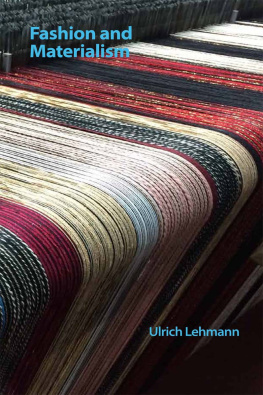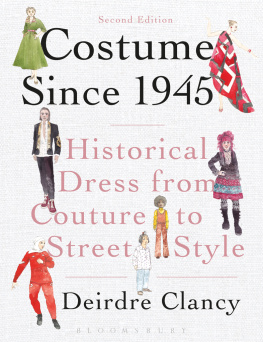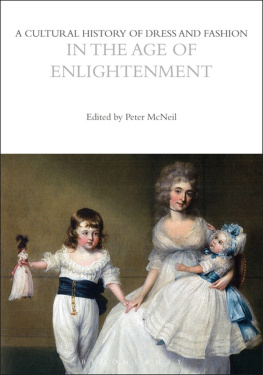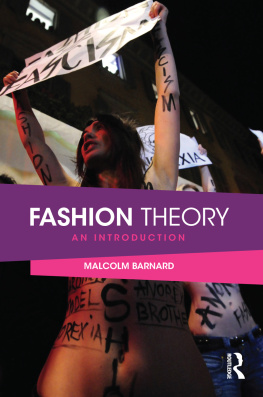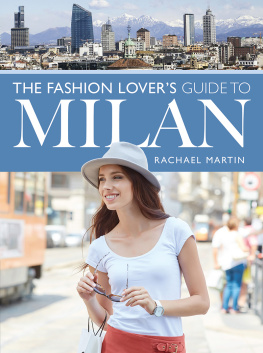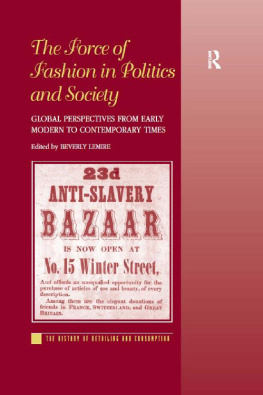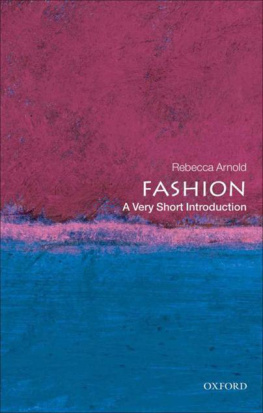
Fashion and Materialism
Technicities
Series Editors: John Armitage, Ryan Bishop and Joanne Roberts, Winchester School of Art, University of Southampton
The philosophy of technicities: exploring how technology mediates art, frames design and augments the mediated collective perception of everyday life.
Technicities will publish the latest philosophical thinking about our increasingly immaterial technocultural conditions, with a unique focus on the context of art, design and media.
Editorial Advisory Board
Benjamin Bratton, Cheryl Buckley, Sean Cubitt, Clive Dilnot, Jin Huimin, Arthur Kroker, Geert Lovink, Scott McQuire, Gunalan Nadarajan, Elin OHara Slavick, Li Shqiao, Geoffrey Winthrop-Young
Published
Lyotard and the Inhuman Condition: Reflections on Nihilism,
Information and Art
By Ashley Woodward
Critical Luxury Studies: Art, Design, Media
Edited by John Armitage and Joanne Roberts
Cold War Legacies: Systems, Theory, Aesthetics
Edited by John Beck and Ryan Bishop
Fashion and Materialism
By Ulrich Lehmann
Queering Digital India: Activisms, Identities, Subjectivities
Edited by Rohit K. Dasgupta and Debanuj DasGupta
Forthcoming Titles
Zero Degree Seeing: Barthes/Burgin and Political Aesthetics
Edited by Ryan Bishop and Sunil Manghani
www.edinburghuniversitypress.com/series/tech
Fashion and Materialism
Ulrich Lehmann

Edinburgh University Press is one of the leading university presses in the UK. We publish academic books and journals in our selected subject areas across the humanities and social sciences, combining cutting-edge scholarship with high editorial and production values to produce academic works of lasting importance. For more information visit our website: www.edinburghuniversitypress.com
Ulrich Lehmann, 2018
Edinburgh University Press Ltd
The Tun Holyrood Road
12(2f) Jacksons Entry
Edinburgh EH8 8PJ
A CIP record for this book is available from the British Library
ISBN 978 1 4744 0793 9
The right of Ulrich Lehmann to be identified as the author of this work has been asserted in accordance with the Copyright, Designs and Patents Act 1988, and the Copyright and Related Rights Regulations 2003 (SI No. 2498).
Contents
Series Editors Preface
Technological transformation has profound and frequently unforeseen influences on art, design and media. At times technology emancipates art and enriches the quality of design. Occasionally it causes acute individual and collective problems of mediated perception. Time after time technological change accomplishes both simultaneously. This new book series explores and reflects philosophically on what new and emerging technicities do to our everyday lives and increasingly immaterial technocultural conditions. Moving beyond traditional conceptions of the philosophy of technology and of techne, the series presents new philosophical thinking on how technology constantly alters the essential conditions of beauty, invention and communication. From novel understandings of the world of technicity to new interpretations of aesthetic value, graphics and information, Technicities focuses on the relationships between critical theory and representation, the arts, broadcasting, print, technological genealogies/histories, material culture and digital technologies and our philosophical views of the world of art, design and media.
The series foregrounds contemporary work in art, design and media whilst remaining inclusive, both in terms of philosophical perspectives on technology and interdisciplinary contributions. For a philosophy of technicities is crucial to extant debates over the artistic, inventive, and informational aspects of technology. The books in the Technicities series concentrate on present-day and evolving technological advances but visual, design-led and mass-mediated questions are emphasised to further our knowledge of their often-combined means of digital transformation.
The editors of Technicities welcome proposals for monographs and well-considered edited collections that establish new paths of investigation.
John Armitage, Ryan Bishop and Joanne Roberts
Introduction
Mans relations with himself have not been essentially transformed. These relations have changed much less than mans relation with the external world, which has fallen increasingly under the control of an ever powerful technicity Therefore, transformative action and radical critique have lagged behind the productive forces and the possibilities for transformation they harbour, and they are deflected from that goal.
Henri Lefebvre, 195961
This book posits fashion as a centre around which to explore positions of materialism. Fashion is understood first as a system that promotes the constant renewal of commodities and secondly, more specifically, as an industry that produces textiles and garments. Materialism is a focus on concrete, physical phenomena and on objects that are produced by subjects. It therefore incorporates a concentration on materiality, on the physical properties of things and how they are represented and perceived by the acting subject. The material world, that is, the world outside of consciousness, serves to found and determine thought. Materialism is understood further as a socio-economic philosophy that is concerned with social conditions of production and in particular with the relationship between labour and capital. These two understandings of materialism are epistemologically, in terms of the origin of knowledge, and historically contingent. In the initial rejection of any metaphysical entity (world spirit, God, etc.), mechanistic materialism, in particular during the eighteenth century in France, had determined human development through an interaction of physical forces, yet it had already applied this concept to social interaction and political emancipation, albeit in theory not in practice. An important feature of mechanistic materialism was change, exemplified by an understanding of the material world as particles of matter that are in constant interaction. This suggested already the usefulness of a dialectical method reasoning by dynamically incorporating contradictions and negation for understanding the distinction between static principles and movement, which would animate dialectical and subsequently historical materialism.
From this historical point of origin and potentised in the political impact of the French Revolution, the materialism of the start of the nineteenth century aimed at understanding things concretely in all their movements: social, political and economic, as well as in the changing conditions of production, with elements of change and interconnection determining the way in which people worked and lived. Accordingly, the development of dialectical materialism was not an abstract concept but a way to comprehend the concrete manifestations of reality, the material world as it presents itself in practice. Karl Marx famously wrote on this shift from the mechanistic to the dialectical: The chief defect of all hitherto existing materialism [] is that the thing, reality, sensuousness, is conceived only in the form of the object or of contemplation, but not as sensuous human activity, practice, not subjectively. Marxs critique of subjectivity, determined by his adopting G. W. F. Hegels integration of subject into object which is a topic of my sixth chapter is one of the bases for the discussion of ideas in this book.
Next page
